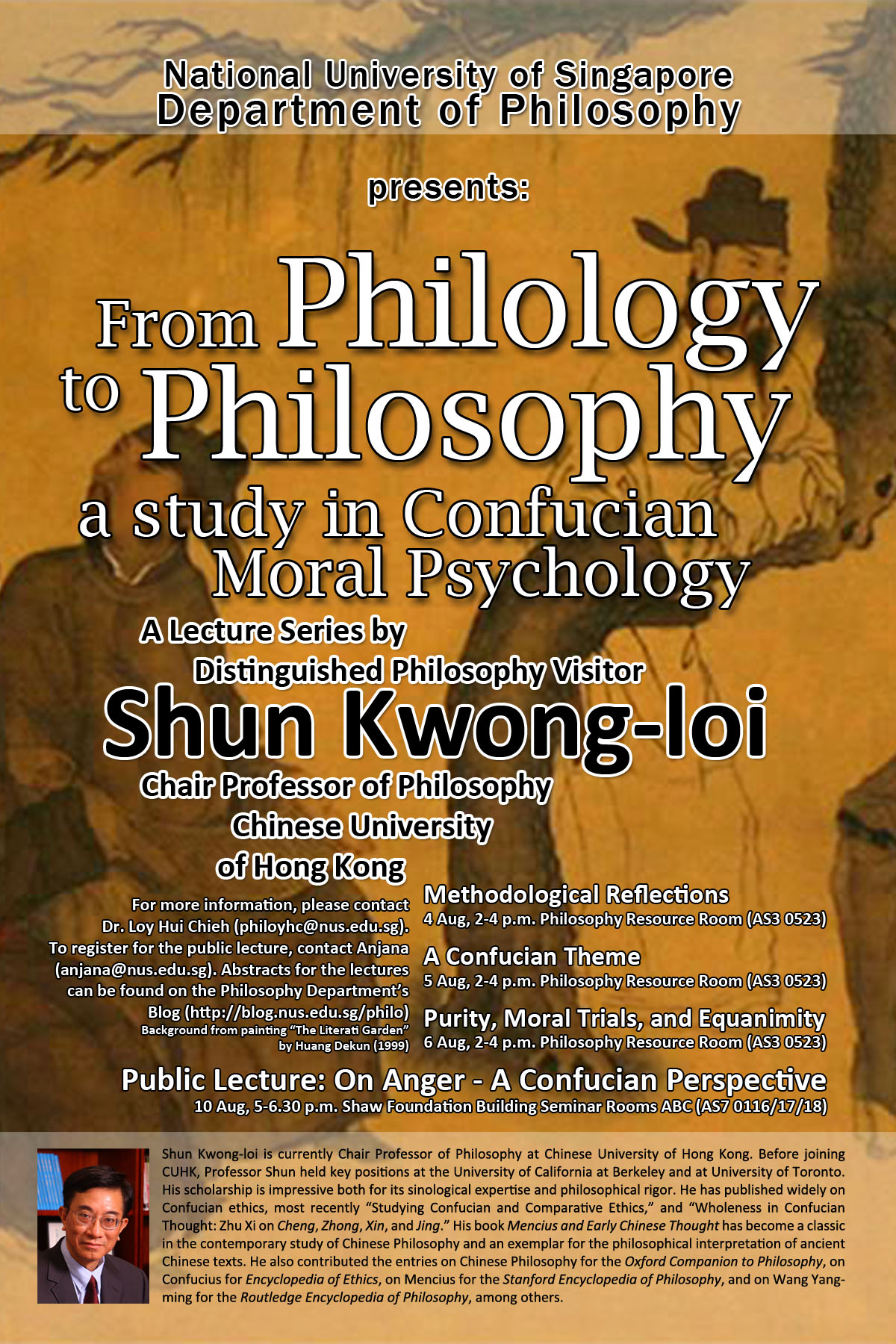http://www.fas.nus.edu.sg/philo/courses/undergraduate-modules.html
http://www.fas.nus.edu.sg/philo/courses/graduate-modules.html
Kent Ridge Common is organising GAW 2011 (Guess And Win 2011)!
Photos of 10 cities around the world are posted on http://kentridgecommon.com/?p=9291, and the person who guesses the most number of cities correctly stands to win 50 SGD, and 5 others will win 10 SGD! More details can be found on the website. The competition is also open to ALL NUS Faculty as well as Staff, and it is free to participate so do give it a shot!!
Choon Hwee (Editor of Kent Ridge Common)
Philosophy Seminar Series: 28 October 2010, 2-3pm, AS3-05-23;
Speaker: Koh Kia Ling, Charlene, Current MA Student, NUS;
Moderator: Dr. Christopher Brown
 Abstract: In “The Liberal Archipelago: A Theory of Diversity and Freedom”, Chandran Kukathas addresses the problem of multiculturalism by focusing on the question of what is to be done if not everyone agrees with a theory of justice. His resultant conception of the good society is one that respects liberty of conscience because living according to the dictates of one’s conscience is of common interest to all persons. I attempt to put forth a criticism of this interest-based account by examining the difficulty of excluding conscience-driven claims.
Abstract: In “The Liberal Archipelago: A Theory of Diversity and Freedom”, Chandran Kukathas addresses the problem of multiculturalism by focusing on the question of what is to be done if not everyone agrees with a theory of justice. His resultant conception of the good society is one that respects liberty of conscience because living according to the dictates of one’s conscience is of common interest to all persons. I attempt to put forth a criticism of this interest-based account by examining the difficulty of excluding conscience-driven claims.
About the Speaker: Charlene is currently pursuing a Masters degree in NUS. Her areas of interest include the philosophy of religion.
More information on the Graduate Seminar Series can be found here.
Philosophy Seminar Series: 28 October 2010, 3-4pm, AS3-05-23;
Speaker: Fong Wai Mung, Current MA Student, NUS;
Moderator: Dr. Christopher Brown
 Abstract: Y: “Why did X perform this monstrous act?” Z: “Because he is evil.” Has Z actually answered Y’s question by invoking the idea of evil? In other words, can the idea of evil perform explanatory work? Eve Garrard thinks that it can with her account of evil. She defends a secular, motive-based theory of evil in ‘Evil as an Explanatory Concept’. She holds that the notion of evil is not necessarily something mysterious beyond the reach of human understanding as is often the case in religious context where evil is associated with the metaphysical or the satanic. People who have no belief in the Devil, she contends, can understand the evil actions of an agent in terms of the reasons which the agent takes there to be (or not to be) for acting so. This is what, on her view, gives the notion of evil explanatory force. I attempt to evaluate whether Garrard has succeeded in giving a cogent account.
Abstract: Y: “Why did X perform this monstrous act?” Z: “Because he is evil.” Has Z actually answered Y’s question by invoking the idea of evil? In other words, can the idea of evil perform explanatory work? Eve Garrard thinks that it can with her account of evil. She defends a secular, motive-based theory of evil in ‘Evil as an Explanatory Concept’. She holds that the notion of evil is not necessarily something mysterious beyond the reach of human understanding as is often the case in religious context where evil is associated with the metaphysical or the satanic. People who have no belief in the Devil, she contends, can understand the evil actions of an agent in terms of the reasons which the agent takes there to be (or not to be) for acting so. This is what, on her view, gives the notion of evil explanatory force. I attempt to evaluate whether Garrard has succeeded in giving a cogent account.
About the Speaker: Wai Mung is currently pursuing a M.A. in philosophy at NUS. Her interests include philosophy of religion and moral philosophy.
More information on the Graduate Seminar Series can be found here.
Philosophy Seminar Series: 28 October 2010, 4-5pm, AS3-05-23;
Speaker: Zhang Ming , Current PhD Student, NUS;
Moderator: Dr. Christopher Brown
 Abstract: In the presentation I am going to develop a notion of postmodern government through a reconstruction of Lyotard’s postmodernism and Nuyen’s postmodern ethics which is drawn out from Lyotard’s theory. The key step of the reconstruction is to reinterpret metanarrative itself as the consequence of totalization. Then I can redefine the postmodern condition as an ideal form of free society rather than a society that is still full of the wrongs of différend. But it will not be achieved at the beginning of the presentation. Instead, firstly I will give a brief introduction of Lyotard’s postmodern condition. To offer a basic framework for my argument, I will then offer a description of Nuyen’s postmodern ethics in my own terms of micro ethics and macro ethics. Then I will confirm the identification of two kinds of terrorism that we can draw out from Lyotard’s works, namely, the violent terrorism and the white terrorism of totality, and emphasize that the white terrorism shares the same structure with the violent terrorism. To deal with the two kinds of terrorism, two strategies will be drawn out from Lyotard’s works, what Nuyen called the political strategy and the reflective strategy. After this I will do the key step mentioned above and then go further to put forth the notion of postmodern government with a reflection on the role of government in dealing with the two kinds of terrorism.
Abstract: In the presentation I am going to develop a notion of postmodern government through a reconstruction of Lyotard’s postmodernism and Nuyen’s postmodern ethics which is drawn out from Lyotard’s theory. The key step of the reconstruction is to reinterpret metanarrative itself as the consequence of totalization. Then I can redefine the postmodern condition as an ideal form of free society rather than a society that is still full of the wrongs of différend. But it will not be achieved at the beginning of the presentation. Instead, firstly I will give a brief introduction of Lyotard’s postmodern condition. To offer a basic framework for my argument, I will then offer a description of Nuyen’s postmodern ethics in my own terms of micro ethics and macro ethics. Then I will confirm the identification of two kinds of terrorism that we can draw out from Lyotard’s works, namely, the violent terrorism and the white terrorism of totality, and emphasize that the white terrorism shares the same structure with the violent terrorism. To deal with the two kinds of terrorism, two strategies will be drawn out from Lyotard’s works, what Nuyen called the political strategy and the reflective strategy. After this I will do the key step mentioned above and then go further to put forth the notion of postmodern government with a reflection on the role of government in dealing with the two kinds of terrorism.
About the Speaker: Zhang Ming completed his undergraduate and master programme of philosophy in Jilin University, China. Now he is a PhD student in first year in department of Philosophy, NUS. His interest is mainly focused on issues of distributive justice and theories of postmodernism. Email address: a0068441@nus.edu.sg
More information on the Graduate Seminar Series can be found here.
Philosophy Seminar Series: 21 October 2010, 2-3pm, AS3-05-23;
Speaker: Yuen Ming De , Current MA Student, NUS;
Moderator: Dr. Christopher Brown
Abstract: Chad Hansen in his book A Daoist Theory of Chinese Thought, and in other publications, argues for the position that (pre-buddhist) early Chinese philosophy has no concept of truth. Hansen argues that this position makes it more plausible to interpret the Mohist’s three standards as proposals about appropriate use of language, rather than proposals about the truth of statements. Bryan W. Van Norden, in his book Virtue Ethics and Consequentialism in Early Chinese Philosophy points out some general objection against the interpretation and problems with Hansen’s interpretation of each standard. I attempt to evaluate and reply to these objections.
About the Speaker: Yuen Ming De is currently pursuing a Masters degree in NUS. His areas of interest include early Chinese Philosophy.
More information on the Graduate Seminar Series can be found here.
Philosophy Seminar Series: 21 October 2010, 3-4pm, AS3-05-23;
Speaker: Mok Wan Hao Jacob , Current MA Student, NUS;
Moderator: Dr. Christopher Brown
Abstract: Contemporary philosophical discourse on scientific modelling has readily acknowledged the idealisation and abstraction that goes into model construction. This open recognition of the built-in inaccuracy of models comes with the nascent worry that the scientific enterprise may sometimes be concerned more with preserving heuristically neat and unified models of reality and less with having these models and their predictions and descriptions best fit actual phenomena. Consequently the first purpose of this talk is to show, through a very brief consideration of historical examples, that this worry of ‘model-saving’ taking precedence over phenomena-explanation is a valid one. Yet as some of these examples will show, ‘model-saving’ as a heuristic strategy has sometimes yielded the correct model. Accordingly, the second purpose of the talk is to attempt to articulate what exactly constitutes ‘model-saving’ as a heuristic strategy and to cache out what criteria and/or conditions must be met for the adoption of the strategy to be considered heuristically sound.
 About the Speaker: Jacob Mok completed his undergraduate studies in philosophy earlier this year at the National University of Singapore with first class honours—his honours thesis being an attempt at defending the Equivalence Thesis. He is currently pursuing a M.A. in philosophy at the very same institution. His interests include the philosophy of science, moral philosophy, and normative ethics. He is fascinated with issues of theoretical confirmation and with how non-humeans about practical reason can hold what they do.
About the Speaker: Jacob Mok completed his undergraduate studies in philosophy earlier this year at the National University of Singapore with first class honours—his honours thesis being an attempt at defending the Equivalence Thesis. He is currently pursuing a M.A. in philosophy at the very same institution. His interests include the philosophy of science, moral philosophy, and normative ethics. He is fascinated with issues of theoretical confirmation and with how non-humeans about practical reason can hold what they do.
More information on the Graduate Seminar Series can be found here.
A Series of lectures by Distinguished Philosophy Visitor Professor Shun Kwong-loi, Chair Professor of Philosophy and Sin Wai Kin Professor of Chinese Culture, Chinese University of Hong Kong.
Session 1: Methodological Reflections (AS3 0523, 4 Aug, 2-4 p.m.) (.pdf)
Session 2: A Confucian Theme (AS3 0523, 5 Aug, 2-4 p.m.)
Session 3: Purity, Moral Trials, and Equanimity (AS3 0523, 6 Aug, 2-4 p.m.) (.pdf)
Public Lecture: On Anger – A Confucian Perspective (AS7 0116/17/18, 10 Aug, 5-6.30 p.m.) (.pdf)
 The series of four lectures present a certain methodological approach to the philosophical study of Chinese thought, illustrated by a number of Confucian ideas related to the Confucian understanding of propriety (yi 義). The first lecture presents the methodological approach, and distinguishes between three different though related goals in the study of Confucian ethical thought. The first seeks to approximate the ideas recorded in early texts through careful textual and historical analysis. The second aims at extracting the insights behind the texts that are of relevance to our own contemporary ethical experiences. The third attempts to build a systematic and reflective account on the basis of these insights that deepens our understanding of our own ethical life. The first task is primarily philological and focuses on the past, namely, on approximating the thinking of past Confucian thinkers. The third task is primarily philosophical and focuses on the present, namely, on building a reflective account of our ethical experiences that is of appeal to us nowadays. The second provides a transition from the philological to the philosophical, and involves our moving between the past and the present in an attempt to articulate the insights of past Confucian thinkers that are of present relevance.
The series of four lectures present a certain methodological approach to the philosophical study of Chinese thought, illustrated by a number of Confucian ideas related to the Confucian understanding of propriety (yi 義). The first lecture presents the methodological approach, and distinguishes between three different though related goals in the study of Confucian ethical thought. The first seeks to approximate the ideas recorded in early texts through careful textual and historical analysis. The second aims at extracting the insights behind the texts that are of relevance to our own contemporary ethical experiences. The third attempts to build a systematic and reflective account on the basis of these insights that deepens our understanding of our own ethical life. The first task is primarily philological and focuses on the past, namely, on approximating the thinking of past Confucian thinkers. The third task is primarily philosophical and focuses on the present, namely, on building a reflective account of our ethical experiences that is of appeal to us nowadays. The second provides a transition from the philological to the philosophical, and involves our moving between the past and the present in an attempt to articulate the insights of past Confucian thinkers that are of present relevance.
The first lecture of the series lays out this methodological approach, while the other three lectures illustrate the three tasks just described, using a number of Confucian ideas related to the Confucian understanding of propriety as the guiding theme. The second lecture provides a discussion of these ideas, including yi 義, ming 命, cheng 誠, xu 虛 and si 私, and analyses the way these concepts are understood in early and later Confucian thought . The third lecture builds on the second by drawing out the philosophical implications of the ideas discussed in the second lecture, focusing on the phenomena purity, moral trials, and equanimity. The fourth lecture builds on the third by providing a more in-depth and primarily philosophical discussion of ideas highlighted in the third lecture, using the phenomenon of anger as a focus for the discussion. Together, the four lectures illustrate a way of integrating philological and philosophical methods in the study of Chinese thought.
Public Lecture, 10 August, 5 to 6.30 p.m., FASS Seminar Room , AS7-01-16/17/18
On Anger – A Confucian Perspective
The lecture discusses the phenomenon of anger as viewed from a Confucian perspective. After introducing the phenomenon of anger, it describes the Confucian view of disgrace and self-regard, and discusses the implication of this view for the Confucian perspective on anger. This perspective explains why the notions of resentment and forgiveness do not play a prominent role in Confucian thought, and also provides a sense in which the Confucian attitude is ‘detached’ in a way that leads to a sense of invulnerability and equanimity.
For more information, please contact Dr. Loy Hui Chieh (philoyhc@nus.edu.sg). To register for the public lecture, please contact Anjana (anjana@nus.edu.sg).
Professor Shun Kwong-loi, Chair Professor of Philosophy at Chinese University of Hong Kong and Sin Wai Kin Professor of Chinese Culture, will be delivering a series of four lectures, “From Philology to Philosophy – A Study in Confucian Moral Psychology,” 4 to 10 August. The last lecture, “On Anger: A Confucian Perspective,” will be open to the public. Before joining CUHK, Professor Shun held key positions at the University of Toronto and the University of California at Berkeley. His scholarship is impressive both for its sinological expertise and its philosophical rigor. He contributed many entries to Encyclopedias on Chinese Philosophy (Oxford Companion to Philosophy), Confucius (Encyclopedia of Ethics), Mencius (Stanford Encyclopedia of Philosophy), Wang Yangming (Routledge Encyclopedia of Philosophy) and other related topics. He has published widely on Confucian ethics, most recently on “Studying Confucian and Comparative Ethics,” and “Wholeness in Confucian Thought: Zhu Xi on Cheng, Zhong, Xin, and Jing.” His book on Mencius and Early Chinese Thought has become a classic in Chinese Philosophy and an exemplar of philosophical interpretation of ancient Chinese texts.
Professor Chad Hansen, Chair Professor Emeritus, University of Hong Kong, is visiting the department in AY 2010/2011. He will be teaching Introduction to Comparative Philosophy (PH3218) and Topics in East Asian Philosophy (PH4205) in Semester I. In Semester II, he will be teaching Comparative Philosophy (PH4213) and a graduate module (PH6760: Philosophical Topics). Among Professor Hansen’s works, the most famous is A Daoist Theory of Chinese Thought. Other monographs include Language and Logic in Ancient China and Laozi: The Tao Te Ching: on The Art of Harmony. He has published many articles and book chapters, recent ones include “The Normative Impact of Comparative Ethics: Human Rights” (Confucian Ethics : A Comparative Study of Self, Autonomy, and Community); “The Metaphysics of Dao” (Comparative Approaches to Chinese Philosophy); “Reading with Understanding: Interpretive Method in Chinese Philosophy” (Dao: A Journal of Comparative Philosophy); “Prolegomena To Future Solutions To “White-Horse Not Horse”: Being Uncharitable To Gongsun Long” (Journal of Chinese Philosophy); “Washing the Dust from my Mirror: The Deconstruction of Buddhism” (Philosophy East and West).
Professor Lisa Raphals joins the department from AY2010/2011 and will be teaching Greek Philosophy: Aristotle (PH 3222) in Semester I, followed by Greek Thinkers (PH4209) and Early Chinese Philosophy I (PH2301) in Semester II. Well known for her nuanced study of both the ancient Greek and ancient Chinese traditions, Professor Raphals is author of Knowing Words: Wisdom and Cunning in the Classical Traditions of China and Greece and Sharing the Light: Representations of Women and Virtue in Early China. Her journal articles and book chapters include “Fate, Fortune, Chance and Luck in Chinese and Greek,” (Philosophy East and West); “Notes on Baoshan Medical Manuscript” (Studies on Recently-Discovered Chinese Manuscripts); “Craft Analogies in Chinese and Greek Argumentation (Literature, Religion and East-West Comparison); “Divination and Medicine in China and Greece” (East Asian Science, Technology, and Medicine); “Daoism and Animals” (A Communion of Subjects: Animals in Religion and Ethics). Her current research focuses on a comparative study of key religious ideas such as fate and divination in China and ancient Greece.